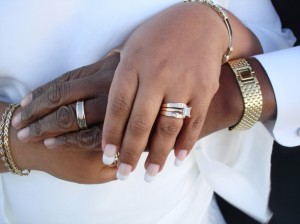
Is marriage for white people? That is the title of a recently published book, which analyzes the human and economic consequences of persistently low marriage rates in the black community.
Black family life has been under siege from the moment the first enslaved Africans arrived on these shores. Two centuries of slavery, Jim Crow segregation, mass incarceration and now a hyper capitalist economy which makes workers irrelevant, have all conspired to make black people less able to form stable family units. The issue is a serious one that deserves discussion, but the way that author Ralph Richard Banks and others frame it is fairly useless and perhaps dangerous as well.
Banks and other observers focus on statistics that indicate most black women may never marry, marrying at less than half the rate of their white counterparts. He focuses on the relative success of black women in comparison with their male counterparts, which prevents them from marrying men of similar backgrounds. Banks concludes that the solution to black female singleness is for more women to marry outside of their racial group, thereby easing the pressure to seek a smaller number of eligible men.
Banks’ analysis and solution are disappointing to say the least. All of the indices of terrible impacts on the health of black families are boiled down to hand wringing about a large number of doomed spinsters. Simply put, black Americans have lower rates of marriage and higher rates of family break ups because of racism. Workplace discrimination and an ever expanding system of mass incarceration have made it difficult if not impossible for women and men who want marriage and children to have them both.
Is Marriage for White People? makes important points, but then devolves into concern for the plight of unmarried women only, and in particular, those who are college educated.
It is not just educated black women who suffer from a lack of marriageable men. Black women of all educational and economic levels do as well. Surely blue collar women deserve as much as attention as their better educated and higher income peers, but they get little of it in the latest conversations about black family life.
Not only does Banks’ argument show a class bias, but it is sexist as well. By focusing primarily on women, Banks ignores the problems faced by black men that result in low rates of marriage. They are likewise disappointed in their abilities to form stable families. He doesn’t acknowledge the pain and frustration they experience when they miss out on the traditional family life which many of them would like to experience.


